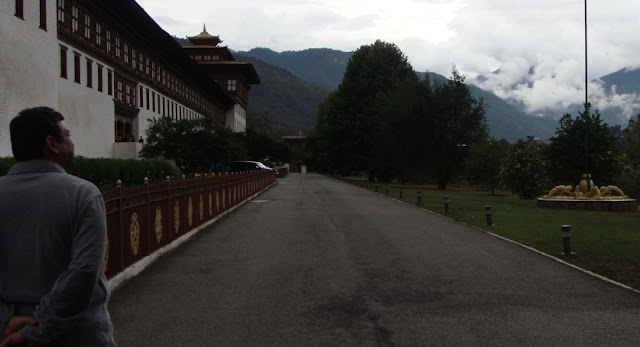A great holiday in Bhutan
Last two weeks I was in Bhutan on a holiday. And this was a truly memorable holiday. I had not made a single trip in the past four or five years that could be called a holiday trip in the true sense.
I have travelled overseas extensively for conferences and functions but can hardly remember when I last had an exclusive holiday. In fact, for me, holidays come bundled with the events and functions that I attend and in small packages like taking a timeout to visit some places of interest or meet people.
This time I took a real holiday after a long time. What was remarkable was the fact that for the first time, since the invention of the handphones, my cellphone was switched off during the entire period and I had very limited access to emails.
 Apart from writing my weekly Sunday article for HT City, I did not even write my regular blogs since it was a personal trip.
Apart from writing my weekly Sunday article for HT City, I did not even write my regular blogs since it was a personal trip.
 Apart from writing my weekly Sunday article for HT City, I did not even write my regular blogs since it was a personal trip.
Apart from writing my weekly Sunday article for HT City, I did not even write my regular blogs since it was a personal trip.
I was in splendid isolation in a country that is insulated from the rest of the world. Bhutan is a country with a rich cultural heritage and remarkable natural beauty. I had travelled across the valleys of Paro, Thimphu, Punakha and others across the Royal Himalayan Kingdom.
Everything in that country seemed so exotic and different from the rest of the world. The presidential suite of the Xweling Hotel in Paro where I stayed stood out from any other. Forget two master bedrooms, balcony, the drawing and dining area, which is not rare in presidential suites the world over, I was pleasantly surprised to find a full-fledged temple in the suite with facilities for chanting and carrying out religious rituals.
Bhutan’s glorious isolation has everything to do with its inaccessible terrain. It is located in the eastern Himalayan foothills between India and the autonomous region of Tibet. From a narrow southern plain formerly called the Duars (at an altitude of 300m), Bhutan quickly rises through the Himalayan foothills (1,600 m) to the valleys of central and western Bhutan (2,600 m) and to the higher mountain chains of the Himalayas (4,000-5,000 m) which runs both east to west and north to south crisscrossing to separate the valleys across regions.
Each valley - Paro, Thimphu, Punakha, Phobjikha and Haa - has its own cachet. They are like a microcosm where the secular and religious histories are in harmony. The religious school called the Drukpa, which traces its origin to 17th century, lent its name to the country and unified its inhabitants.
In the Dzongkha language, Bhutan is called Druk Yul and the Bhutanese people Drukpas. The poetic translation of Druk Yul is ‘Land of the Dragons’, which can be explained by the following anecdote.
While travelling through the valleys and spending some quality time, I realized that it was such a beautiful place so close to Kolkata yet hardly any tourists come here.
The lodge manager of Amankora Punakha told me that in the last year there weren't even 25 beds for the Indian guests. The whole country was full of Canadians, Japanese and Chinese tourists. The Aman Hotel group has five properties in Bhutan with US $ 1800 per day tariff.
With its beautiful landscape, green topography and pristine natural beauty, Bhutan has it all for a perfect retreat. Anyone can easily hear and differentiate the sound of jungles, mountains, rivers and the sounds of silence from deep inside the valleys.
I had cancelled my scheduled trip to Lake Como, Italy, and opted for this trip to Bhutan. I think I made not only the right choice but also a great one.
ess bee





Comments
Post a Comment